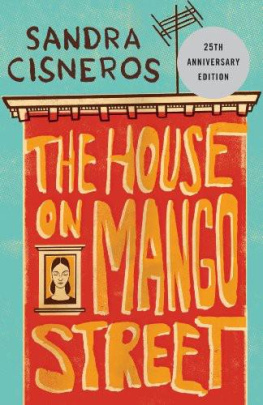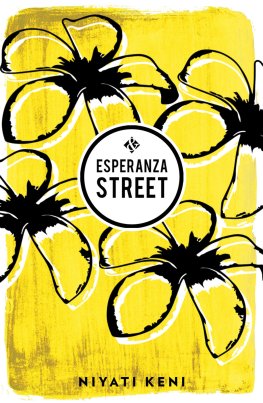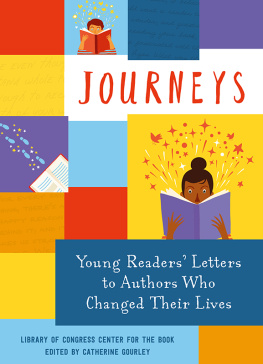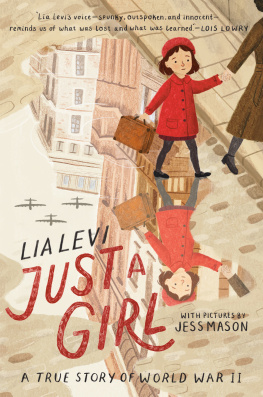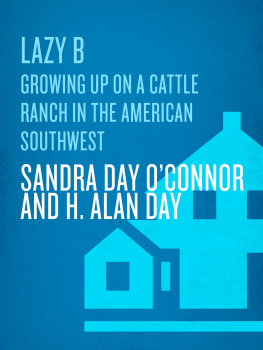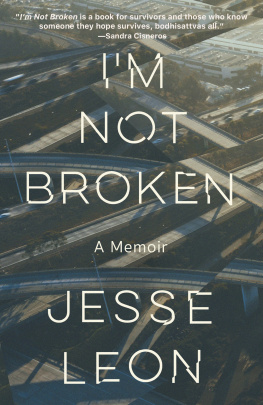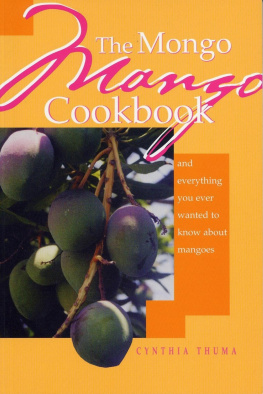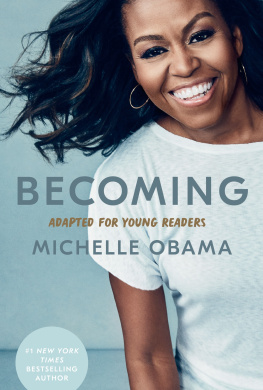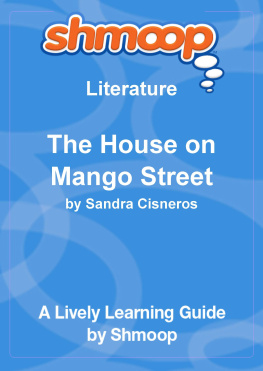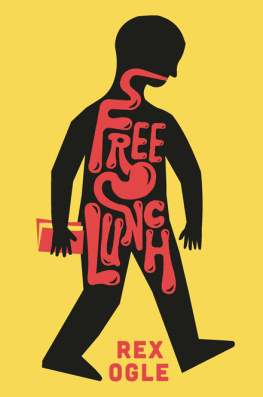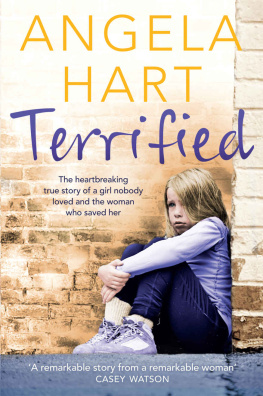The House on Mango Street
by Sandra Cisneros
Contents
Introduction
The House on Mango Street
Hairs
Boys & Girls
My Name
Cathy Queen of Cats
Our Good Day
Laughter
Gil's Furniture Bought & Sold
Meme Ortiz
Louie, His Cousin & His Other Cousin
Marin
Those Who Don't
There Was an Old Woman She Had So Many Children She Didn't Know What to Do Alicia Who Sees Mice
Darius & the Clouds
And Some More
The Family of Little Feet
A Rice Sandwich
Chanclas
Hips
The First Job
Papa Who Wakes Up Tired in the Dark
Born Bad
Elenita, Cards, Palm, Water
Geraldo No Last Name
Edna's Ruthie
The Earl of Tennessee
Sire
Four Skinny Trees
No Speak English
Rafaela Who Drinks Coconut & Papaya Juice on Tuesdays Sally
Minerva Writes Poems
Bums in the Attic
Beautiful & Cruel
A Smart Cookie
What Sally Said
The Monkey Garden
Red Clowns
Linoleum Roses
The Three Sisters
Alicia & I Talking on Edna's Steps
A House of My Own
Mango Says Goodbye Sometimes
A Note About the Author
Introduction
It's been ten years since The House on Mango Street was first published. I began writing it in graduate school, the spring of 1977, in Iowa City. I was twenty-two years old.
I'm thirty-eight now, far from that time and place, but the questions from readers remain, Are these stories true? Are you Esperanza?
When I began The House on Mango Street, I thought I was writing a memoir. By the time I finished it, my memoir was no longer memoir, no longer autobiographical. It had evolved into a collective story peopled with several lives from my past and present, placed in one fictional time and neighborhoodMango Street.
A story is like a Giacometti sculpture. The farther away it is from you, the clearer you can see it. In Iowa City, I was undergoing several changes of identity. For the first time I was living alone, in a community very different in class and culture from the one where I was raised. This caused so much unrest I could barely speak, let alone write about it. The story I was living at twenty-two would have to wait, but I could take the story of an earlier place, an earlier voice, and record that on paper.
The voice of Mango Street and all my work was born at one moment, when I realized I was different. This sounds absurd and simple, but until Iowa City, I assumed the world was like Chicago, made up of people of many cultures all living togetheralbeit not happily at times but still coexisting. In Iowa, I was suddenly aware of feeling odd when I spoke, as if I were a foreigner. But this was my land too. This is not to say I hadn't felt this "otherness" before in Chicago, but I hadn't felt it quite as keenly as I did in graduate school. I couldn't articulate what it was that was happening, except I knew I felt ashamed when I spoke in class, so I chose not to speak.
I can say my political consciousness began the moment I recognized my otherness. I was in a graduate seminar on memory and the imagination. The books required were Vladimir Nabokov's Speak Memory, Isak Dinesen's Out of Africa, and Gaston Bachelard's Poetics of Space. I had enjoyed the first two, but as usual I said nothing, just listened to the dialogue around me, too afraid to speak. The third book, though, left me baffled. I assumed I just didn't get it because I wasn't as smart as everyone else, and if I didn't say anything, maybe no one else would notice.
The conversation, I remember, was about the house of memorythe attic, the stairwells, the cellar. Attic? My family lived in third-floor flats for the most part, because noise traveled down.
Stairwells reeked of Pine Sol from the Saturday scrubbing. We shared them with the people downstairs; they were public zones no one except us thought to clean. We mopped them all right, but not without resentment for cleaning up some other people's trash. And as for cellars, we had a basement, but who'd want to hide in there? Basements were filled with urban fauna. Everyone was scared to go in there including the meter reader and the landlord. What was this guy Bachelard talking about when he mentioned the familiar and comforting house of memory? It was obvious he never had to clean one or pay the landlord rent for one like ours.
Then it occurred to me that none of the books in this class or in any of my classes, in all the years of my education, had ever discussed a house like mine. Not in books or magazines or films. My classmates had come from real houses, real neighborhoods, ones they could point to, but what did I know?
When I went home that evening and realized my education had been a liehad made presumptions about what was "normal," what was American, what was valuableI wanted to quit school right then and there, but I didn't. Instead, I got angry, and anger when it is used to act, when it is used nonviolently, has power. I asked myself what I could write about that my classmates could not. I didn't know what I wanted exactly, but I did have enough sense to know what I didn't want. I didn't want to sound like my classmates; I didn't want to keep imitating the writers I had been reading. Their voices were right for them but not for me.
Instead, I searched for the "ugliest" subjects I could find, the most un-"poetic"slang, monologues in which waitresses or kids talked their own lives. I was trying as best I could to write the kind of book I had never seen in a library or in a school, the kind of book not even my professors could write. Each week I ingested the class readings and then went off and did the opposite. It was a quiet revolution, perhaps a reaction taken to extremes, but it was out of this negative experience that I found something positive: my own voice.
The language in Mango Street is based on speech. It's very much an antiacademic voicea child's voice, a girl's voice, a poor girl's voice, a spoken voice, the voice of an American-Mexican. It's in this rebellious realm of antipoetics that I tried to create a poetic text with the most unofficial language I could find. I did it neither ingenuously nor naturally. It was as clear to me as if I were tossing a Molotov.
At one time or another, we all have felt other. When I teach writing, I tell the story of the moment of discovering and naming my otherness. It is not enough simply to sense it; it has to be named, and then written about from there. Once I could name it, I ceased being ashamed and silent. I could speak up and celebrate my otherness as a woman, as a working-class person, as an American of Mexican descent.
When I recognized the places where I departed from my neighbors, my classmates, my family, my town, my brothers, when I discovered what I knew that no one else in the room knew, and then spoke it in a voice that was my voice, the voice I used when I was sitting in the kitchen, dressed in my pajamas, talking over a table littered with cups and dishes, when I could give myself permission to speak from that intimate space, then I could talk and sound like myself, not like me trying to sound like someone I wasn't. Then I could speak, shout, laugh from a place that was uniquely mine, that was no one else's in the history of the universe, that would never be anyone else's, ever.
I wrote these stories that way, guided by my heart and by my ear. I was writing a novel and didn't know I was writing a novel; if I had, I probably couldn't have done it. I knew I wanted to tell a story made up of a series of stories that would make sense if read alone, or that could be read all together to tell one big story, each story contributing to the wholelike beads in a necklace. I hadn't seen a book like this before. After finishing my book, I would discover these novels later: Gwendolyn Brooks' Maud Martha, Nellie Campobello's Cartucho, Ermilo Abreu Gomez's Canek, and Toms Rivera's Y no se lo trag la tierra.
Next page
